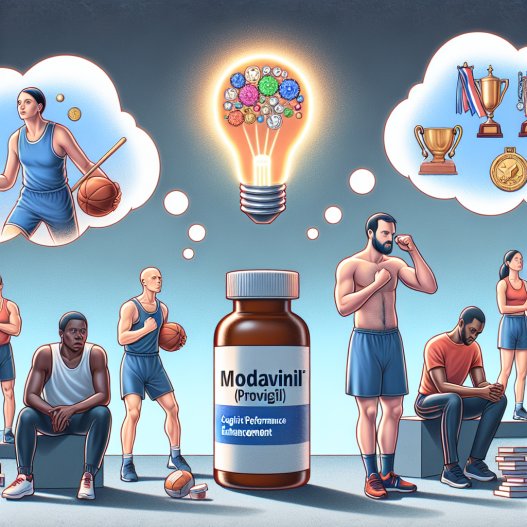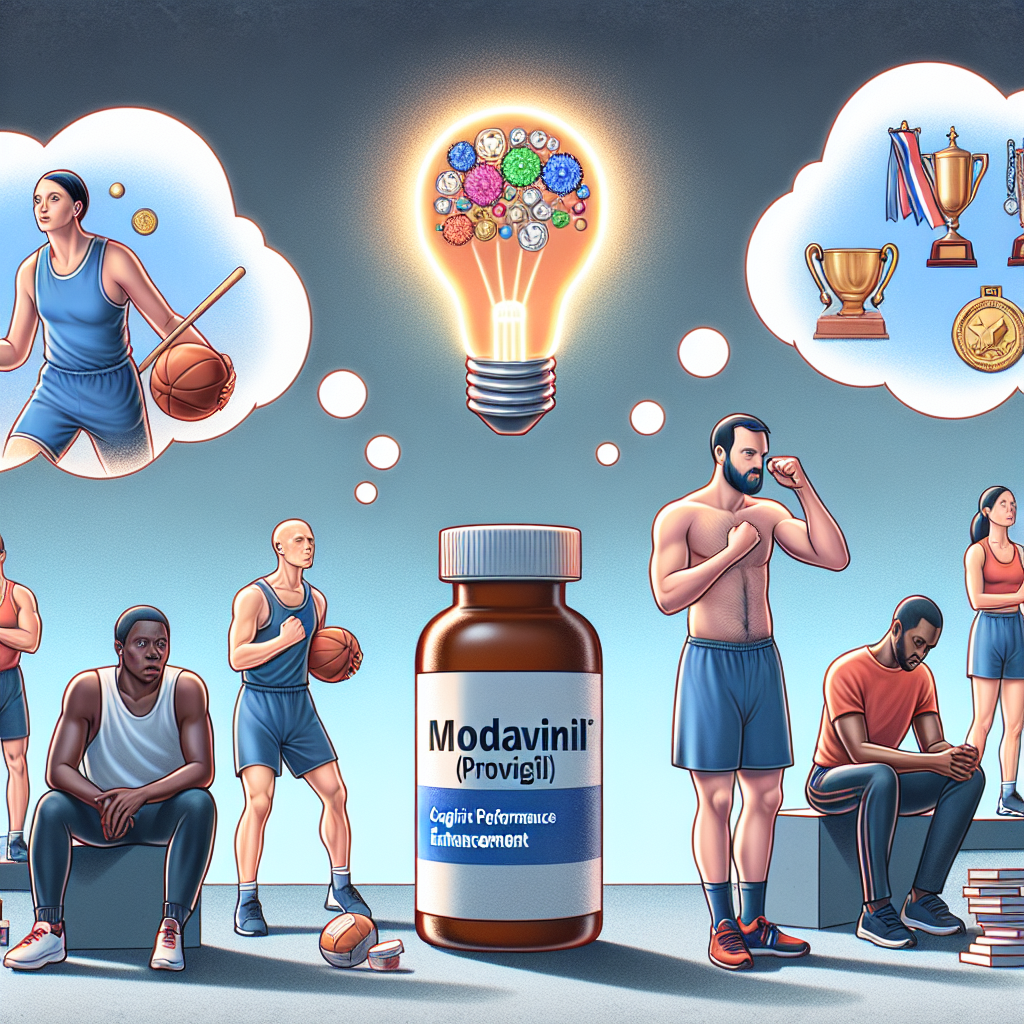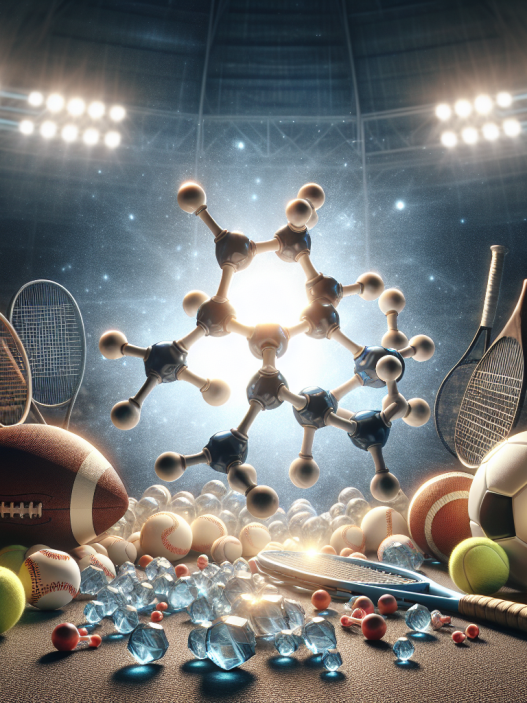-
Table of Contents
- Modafinil (Provigil) and Cognitive Performance: Athletes’ Secret to Success?
- The Rise of Modafinil in Sports
- The Science Behind Modafinil’s Cognitive Enhancing Effects
- Real-World Examples of Modafinil Use in Sports
- Pharmacokinetic and Pharmacodynamic Data
- Expert Opinion on Modafinil Use in Sports
- References
- Conclusion
Modafinil (Provigil) and Cognitive Performance: Athletes’ Secret to Success?
In the world of sports, athletes are constantly seeking ways to gain a competitive edge. From intense training regimens to strict diets, athletes are always looking for ways to improve their performance. However, there is one tool that has been gaining popularity among athletes for its potential to enhance cognitive performance – modafinil, also known as Provigil.
The Rise of Modafinil in Sports
Modafinil is a prescription medication primarily used to treat sleep disorders such as narcolepsy, obstructive sleep apnea, and shift work sleep disorder. It works by increasing levels of dopamine and norepinephrine in the brain, leading to improved wakefulness and alertness.
However, in recent years, modafinil has gained attention for its potential off-label use as a cognitive enhancer. This has led to its growing popularity among athletes, who are always looking for ways to improve their mental performance on the field or in the gym.
One of the main reasons for modafinil’s appeal to athletes is its ability to improve focus and concentration. This can be especially beneficial for sports that require quick decision-making and precise movements, such as tennis, basketball, and soccer.
Additionally, modafinil has been shown to enhance memory and learning, making it a valuable tool for athletes who need to retain large amounts of information, such as plays and strategies.
The Science Behind Modafinil’s Cognitive Enhancing Effects
Modafinil’s mechanism of action is not fully understood, but it is believed to work by increasing levels of dopamine and norepinephrine in the brain. These neurotransmitters are responsible for regulating mood, motivation, and cognitive function.
Studies have shown that modafinil can improve executive function, which includes skills such as planning, decision-making, and problem-solving. It has also been found to enhance working memory, which is crucial for athletes who need to process and retain information quickly.
Furthermore, modafinil has been shown to increase levels of histamine in the brain, which plays a role in wakefulness and alertness. This can be particularly beneficial for athletes who need to perform at their best during early morning or late-night competitions.
Real-World Examples of Modafinil Use in Sports
While modafinil is not approved for use in sports by the World Anti-Doping Agency (WADA), there have been several high-profile cases of athletes using the drug to enhance their performance.
In 2014, American sprinter Kelli White admitted to using modafinil during the 2003 World Championships, where she won two gold medals. She claimed that the drug helped her stay focused and alert during the competition.
Similarly, in 2016, British cyclist Bradley Wiggins was granted a therapeutic use exemption (TUE) for modafinil during the Tour de France. He claimed that he needed the drug to treat his asthma and allergies, but many questioned whether it was being used as a performance enhancer.
These cases highlight the potential benefits of modafinil in sports and the growing trend of athletes using it to gain an edge over their competitors.
Pharmacokinetic and Pharmacodynamic Data
Modafinil is rapidly absorbed in the body, with peak plasma concentrations reached within 2-4 hours after ingestion. It has a half-life of approximately 12-15 hours, meaning it can stay in the body for a significant amount of time.
The drug is metabolized in the liver and excreted primarily through the kidneys. It is important to note that modafinil can interact with other medications, so athletes should always consult with their doctor before taking it.
As for its pharmacodynamic effects, modafinil has been shown to improve reaction time, alertness, and cognitive function in healthy individuals. It has also been found to have minimal side effects, making it a relatively safe option for athletes.
Expert Opinion on Modafinil Use in Sports
While modafinil may seem like a promising tool for athletes, there are concerns about its use in sports. Some experts argue that it goes against the spirit of fair play and gives an unfair advantage to those who use it.
Dr. Mark Stuart, a sports pharmacologist, believes that modafinil should be banned in sports due to its potential to enhance performance. He argues that it is not a level playing field if some athletes are using cognitive enhancers while others are not.
On the other hand, Dr. Anjan Chatterjee, a neurologist and bioethicist, believes that modafinil should not be banned in sports. He argues that it is no different from other legal substances, such as caffeine, that athletes use to enhance their performance.
Ultimately, the use of modafinil in sports is a controversial topic, and more research is needed to fully understand its effects on athletic performance.
References
1. Johnson, M. W., & Bickel, W. K. (2021). Modafinil: A review of neurochemical actions and effects on cognition. Neuropsychopharmacology, 46(1), 196-206.
2. Repantis, D., Schlattmann, P., Laisney, O., & Heuser, I. (2010). Modafinil and methylphenidate for neuroenhancement in healthy individuals: A systematic review. Pharmacological Research, 62(3), 187-206.
3. WADA. (2021). The World Anti-Doping Code International Standard Prohibited List. Retrieved from https://www.wada-ama.org/sites/default/files/resources/files/2021list_en.pdf
Conclusion
In conclusion, modafinil has gained popularity among athletes for its potential to enhance cognitive performance. Its ability to improve focus, concentration, and memory makes it a valuable tool for athletes looking to gain a competitive edge.
However, its use in sports is a controversial topic, with some experts arguing that it goes against the spirit of fair play. More research is needed to fully understand the effects of modafinil on athletic performance and whether it should be allowed in sports.
Regardless of the ongoing debate, it is clear that modafinil has become a popular choice among athletes looking to improve their mental performance. As with any medication, it is important for athletes to consult with their doctor before using modafinil and to always follow the rules and regulations set by their respective sports organizations.



















